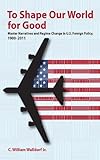To Shape Our World for Good : Master Narratives and Regime Change in U.S. Foreign Policy, 1900–2011 / C. William Walldorf.
Material type: TextPublisher: Ithaca, NY : Cornell University Press, [2019]Copyright date: ©2019Description: 1 online resource (294 p.) : 1 b&w line drawing, 7 chartsContent type:
TextPublisher: Ithaca, NY : Cornell University Press, [2019]Copyright date: ©2019Description: 1 online resource (294 p.) : 1 b&w line drawing, 7 chartsContent type: - 9781501738289
- Regime change -- History -- 20th century
- Regime change -- History -- 21st century
- International Studies
- Political Science & Political History
- U.S. History
- POLITICAL SCIENCE / International Relations / General
- geopolitics, liberal narrative, master narratives, policy, pluralism, U.S. foreign policy, grand strategy, U.S. expansionism
- 327.73009/04 23
- E744 .W2593 2019
- online - DeGruyter
| Item type | Current library | Call number | URL | Status | Notes | Barcode | |
|---|---|---|---|---|---|---|---|
 eBook
eBook
|
Biblioteca "Angelicum" Pont. Univ. S.Tommaso d'Aquino Nuvola online | online - DeGruyter (Browse shelf(Opens below)) | Online access | Not for loan (Accesso limitato) | Accesso per gli utenti autorizzati / Access for authorized users | (dgr)9781501738289 |
Frontmatter -- Contents -- Acknowledgments -- Introduction: Master Narratives and Forceful Regime Change -- 1. The Liberal Narrative, Restraint Narrative, and Patterns of Forceful Regime Change -- 2. The Broad Patterns -- 3. Regime Change in Korea and China -- 4. Regime Change in Cuba and Vietnam -- 5. Regime Change in El Salvador and Grenada -- 6. Regime Change in Iraq and Libya -- 7. The Implications of Master Narrative Politics -- Notes -- Index
restricted access online access with authorization star
http://purl.org/coar/access_right/c_16ec
Why does the United States pursue robust military invasions to change some foreign regimes but not others? Conventional accounts focus on geopolitics or elite ideology. C. William Walldorf, Jr., argues that the politics surrounding two broad, public narratives—the liberal narrative and the restraint narrative—often play a vital role in shaping US decisions whether to pursue robust and forceful regime change.Using current sociological work on cultural trauma, Walldorf explains how master narratives strengthen (and weaken), and he develops clear predictions for how and when these narratives will shape policy. To Shape Our World For Good demonstrates the importance and explanatory power of the master-narrative argument, using a sophisticated combination of methods: quantitative analysis and eight cases in the postwar period that include Korea, Vietnam, and El Salvador during the Cold War and more recent cases in Iraq and Libya. The case studies provide the environment for a critical assessment of the connections among the politics of master narratives, pluralism, and the common good in contemporary US foreign policy and grand strategy. Walldorf adds new insight to our understanding of US expansionism and cautions against the dangers of misusing popular narratives for short-term political gains—a practice all too common both past and present.
Mode of access: Internet via World Wide Web.
In English.
Description based on online resource; title from PDF title page (publisher's Web site, viewed 26. Apr 2024)


